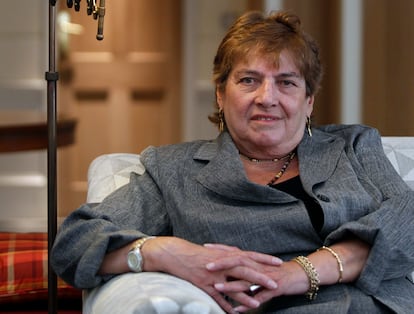The Hispanicist Shirley Mangini (Pennsylvania 1946-California 2024) died last October in her home in Long Beach, as she wished, after a long illness that kept her from her work in recent years.
Mangini was a key scholar in the study of Spanish women of the Second Republic. He knew them, treated them and vindicated them, and proof of this is his magnificent book The modern ones of Madrid (Península, 2001), fundamental basis for all the works that have been developed subsequently, although it is not always recognized as the main source.
In this book he spoke to us about intellectual women, but years before he had given names and surnames to numerous women who had actively participated in the construction and defense of the Second Spanish Republic. Working women, from humble backgrounds, others from a privileged class, but all of them testimony to the thousands of Spaniards who also waged war, brave women who wanted to resist fascism and who for this reason were repressed by Franco and silenced by their companions.
Based on meticulous work, with many interviews with diverse women, with the reading of published or unpublished texts, and with visits to numerous archives and libraries, Mangini gathered vast documentation on the subject that she would generously share with her colleagues or young women. researchers who needed it.
The generation of 50
Before delving into the study of Spanish women, she had been interested in the Spanish writers of the 1950s generation. Encouraged by her husband for a short period of time, the poet Ángel González, the recent graduate from the University of New Mexico obtained a scholarship in Austin to obtain her master’s degree with a thesis on Jaime Gil de Biedma. He would later complete his doctorate in New Mexico, with a thesis on Juan Marsé. Already as a professor at Yale University, she would undertake a laborious investigation into the anti-Franco intellectuals, which would culminate with the publication of the book Reds and rebels. The culture of dissidence during the Franco regime (1987).
From a kinder position, at California State University, Mangini gave himself over to the pleasure that researching his interests brought him. From here came the publication, first in English and then in Spanish, of the biography of the painter Maruja Mallo, after which she immersed herself in combining two of her interests related to Spain: gastronomy and intellectual women of the late 19th century and beginning of the 20th century, its modern ones. The illness prevented him from finishing, precisely, the book about the gastronomy of Emilia Pardo Bazán.
Mangini, a fun, happy, brave person, made friends with many of the people he treated as an object of study. Between the pages of Rosa Chacel’s diaries appears a young Shirley Mangini, a curious, alert and intelligent traveler. Victoria Kent’s dedications reflect the affection and laughter shared in the apartment she lived in with Louise Crane, near Central Park. The real Mangini also enjoyed making new friends, the result of her Madrid adventures. Friends she met in crazy Italian courses or in bars where they shared tripe and glasses of chinchón. Friends like herself: red, rebellious and modern.

